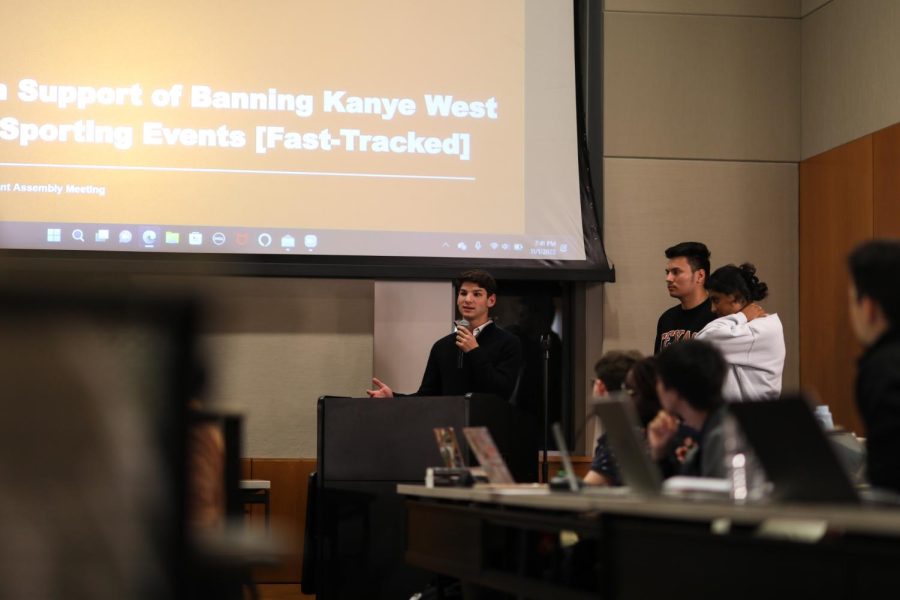Student Government advocates for banning Kanye West music from UT sporting events
Alexander Feinstein, along with Jerold Holmon and Surekha Balakrishnan, introduced legislation at the Student Government meeting on Nov. 1, 2022. The legislation calls for the university to ban Kanye West music at UT sporting events.
November 2, 2022
Student Government called for a ban of Kanye West music from UT sporting events in light of the artist’s recent antisemetic remarks.
Student Government unanimously passed a resolution on Nov. 1 advocating for the administration to ban all music by Kanye West in solidarity with Jewish students at the University. Alexander Feinstein, a Plan II and business sophomore, introduced the legislation, along with Jerold Holman and Surekha Balakrishnan.
University-wide representative Feinstein said the bill was especially relevant after the antisemetic act that occurred at the Florida and Georgia football game on Oct. 29.
“Somebody came out, and they brought a projector in on the side of the stadium and said ‘Kanye is right about the Jews,’” Feinstein said. “Football and sports is something that brings us all together. … We should all feel safe there and we should all feel that it’s a comforting place.”
Feinstein said the bill is a way to start a national campaign against hate speech.
“I saw this more as an opportunity for Student Government to truly represent student voices and come together against hate speech, not just limited to antisemitism,” Feinstein said.
The resolution passed with one amendment, proposed by Dadrian Whittington, a College of Liberal Arts representative, to address the anti-Black remarks Ye made in the past.
“I do believe discussing antisemitism is very important,” Whittington said. “I knew if we didn’t also include that Kanye has been racist to a number of other groups, that people would use that against the attempt to censor his music at the games. So I thought (the amendment) would help the bill be stronger.”
Exercise science freshman Fatima Dahab said she partially agrees with the ban, but doesn’t think the bill goes far enough to deplatform other artists who made inflammatory remarks.
“If they’re going to penalize somebody for being hateful, they should apply that to more than just Kanye,” Dahab said.
Dahab said she found it concerning that a bill wasn’t brought forward to ban Ye’s music after the number of anti-Black statements he’s made in the past.
Whittington said he added the amendment to account for criticism that the bill didn’t address Ye’s anti-Blackness. The amendment, which stated, “Kanye West has also said racist remarks to the African American community and a number of other communities,” was unanimously approved by the assembly.
The resolution will now go to University administration for approval, Feinstein said.
“(The) University of Texas does not stand with hate speech,” Feinstein said. “Student Government does not stand for hate speech, and this is how we are going to show it.”
Feinstein said the bill only calls for Ye’s music to be banned at sports games to make it more enforceable.
“I want to make sure that this is actually implemented,” Feinstein said. “I want to make sure that the University of Texas stands by our decision to represent the student body and say that Kanye West will never again be played during an athletic event at the University of Texas.”



